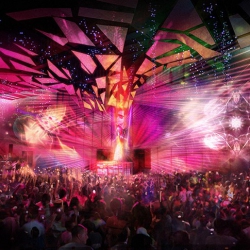The Borgata Hotel Casino & Spa plans to invest $14 million to create a new entertainment facility and nightclub on the property. The nightclub, which is going to cover 18,000 square feet of space, is set to open in the spring of 2016.
Borgata’s newest attraction is part of a wider plan by Atlantic City casinos to boost revenue through non-gaming sources. The idea is resorts can draw a wider customer base if they add non-gaming amenities. Not only do nightclubs, restaurants, spas, and concert venues attract people who would never gamble, but it makes it more likely gamblers with non-gaming family members might choose the resort.
The Premier Nightclub
The name of the new establishment is going to be “The Premier Nightclub“. Borgata has hired Josh Held of “Josh Held Design” to design the new club. He is a celebrated designer who has had successful projects in New York City, Las Vegas, Chicago, Dubai, and Singapore.
Certain design elements are known about the nightclub so far. The casino management said it has a “modern ambiance” with a deejay booth, tiered booths for patrons, a stage for performers, and a digital proscenium. The main floor of the club will have a 2 x 35 bar on either side of the room. A mezzanine section will overlook the main floor, with a 6′ disco ball suspended above the floor. The disco ball will be surrounded by a 25′ diameter chandelier. It will have programmable light.
Joe Lupo on the Timing
Joe Lupo, the SVP of Operations for the Borgata, said his company wants to have the trendiest nightclub in Atlantic City. Lupo said, “We felt now was the ideal time to once again redefine nightlife entertainment with a venue designed to rival the top clubs in Las Vegas, Miami, and New York.”
The casino says it has been testing its gaming revenues versus its non-gaming revenues in the past couple of years, trying to determine how best to spend capital to improve the business’s overall financial outlook. It is clear from the investments that the non-gaming portion of the business is the calculated area of growth.
Borgata’s Recent Non-Gaming Investments
The company invested $14 million in the construction of the Borgata Festival Park, which is designed for summertime outdoor concerts and culture festivals. It also spent on a $13 million property renovation, which included a redesign and expansion of the award-winning Borgata Buffet. That represents a total of $41 million invested in non-gaming attractions in the past year.
Borgata is testing the hypothesis which says Atlantic City’s future is based on non-gaming attractions. Mayor Don Guardian is attempting to transition the seaside resort into a non-gaming tourist destination. Many would say that is the only option after the Atlantic City casino industry collapsed over the past decade.
Borgata’s Place in the Gaming Economy
Atlantic City has seen a rapid decline in the past few years, but Borgata continues to post strong numbers. For the past couple of years, roughly half of the revenues generated by the Atlantic City casino industry have been generated by Borgata. In November 2015, it generated $57 million in revenues, while its next-nearest rival, Harrah’s, generated about $30 million in revenues.
All casinos in the area might do best to take a page from the Borgata’s investments. Momentum is building for a referendum on whether the state should allow casino licenses outside of Atlantic City. If that happens, then Altantic City is likely to have two North Jersey casinos — one in the Meadowlands and one in Jersey City — as competition for business in the state. It’s a minor boon that state lawmakers want to restrict licensing to the Atlantic City casino companies, though the State Senate and the General Assembly have not yet agreed on whether that stipulation should apply to one of the casinos or both.
Drive for a North Jersey Casino
Senate President Stephen Sweeney wants to use $1 billion of the North Jersey casino revenues to fund Atlantic City’s transition to a non-gaming economy. That is Sweeney’s strategy for making the North Jersey plan more agreeable to Atlantic City’s leaders, who complain that a casino or two along the banks of the Hudson River would spell the end for the Atlantic City casino industry.
Borgata appears to have a plan to survive, whether the other casinos in the city do or not. Gaming destinations should be attractive, with as many amenities as possible. That was the lesson learned by Las Vegas in the past couple of decades. These days, the Las Vegas Strip collected 60% of its revenues from non-gaming attractions.
While Borgata and Atlantic City are never going to match the Las Vegas Strip’s lucrative list of non-gaming attractions, it can create a profitable business based around a combination of gambling and amenities. The Premier Nightclub should be one more attraction for those trying to decide whether to visit the Boardwalk in the years to come.

